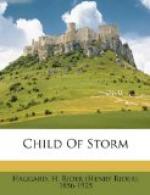"Kill, Amawombe, kill!" answered by another cry of:
"Toss, Usutu, toss!"
After that, what happened? Heaven knows alone—or at least I do not. But in later years Mr. Osborn, afterwards the resident magistrate at Newcastle, in Natal, who, being young and foolish in those days, had swum his horse over the Tugela and hidden in a little kopje quite near to us in order to see the battle, told me that it looked as though some huge breaker—that breaker being the splendid Amawombe—rolling in towards the shore with the weight of the ocean behind it, had suddenly struck a ridge of rock and, rearing itself up, submerged and hidden it.
At least, within three minutes that Usutu regiment was no more. We had killed them every one, and from all along our lines rose a fierce hissing sound of “S’gee, S’gee” ("Zhi” in the Zulu) uttered as the spears went home in the bodies of the conquered.
That regiment had gone, taking nearly a third of our number with it, for in such a battle as this the wounded were as good as dead. Practically our first line had vanished in a fray that did not last more than a few minutes. Before it was well over the second Usutu regiment sprang up and charged. With a yell of victory we rushed down the slope towards them. Again there was the roar of the meeting shields, but this time the fight was more prolonged, and, being in the front rank now, I had my share of it. I remember shooting two Usutu who stabbed at me, after which my gun was wrenched from my hand. I remember the melee swinging backwards and forwards, the groans of the wounded, the shouts of victory and despair, and then Scowl’s voice saying:
“We have beat them, Baas, but here come the others.”
The third regiment was on our shattered lines. We closed up, we fought like devils, even the bearer boys rushed into the fray. From all sides they poured down upon us, for we had made a ring; every minute men died by hundreds, and, though their numbers grew few, not one of the Amawombe yielded. I was fighting with a spear now, though how it came into my hand I cannot remember for certain. I think, however, I wrenched it from a man who rushed at me and was stabbed before he could strike. I killed a captain with this spear, for as he fell I recognised his face. It was that of one of Cetewayo’s companions to whom I had sold some cloth at Nodwengu. The fallen were piled up quite thick around me—we were using them as a breastwork, friend and foe together. I saw Scowl’s horse rear into the air and fall. He slipped over its tail, and next instant was fighting at my side, also with a spear, muttering Dutch and English oaths as he struck.
“Beetje varm! [a little hot] Beetje varm, Baas!” I heard him say. Then my horse screamed aloud and something hit me hard upon the head—I suppose it was a thrown kerry—after which I remember nothing for a while, except a sensation of passing through the air.




